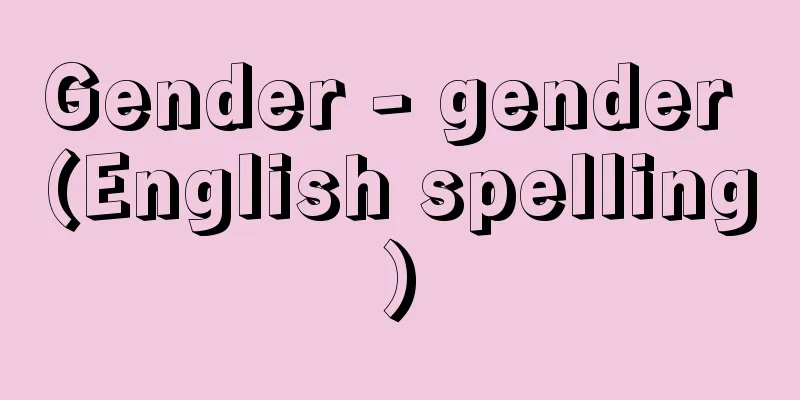Gender - gender (English spelling)

|
Generally translated as "social and cultural sex differences." It refers to the concept of gender differences that are not innate but culturally acquired or created. In cultural anthropology, gender research explores how men and women fulfill their respective roles in daily life, how their respective social roles are recognized and evaluated, and why the differences that arise there are constructed. While "men/women" have their own roles in family responsibilities, work roles, and other aspects of daily life, they are also related to each other. In any culture, people construct cultural meanings there. Therefore, morphological sex differences created by different chromosomes are different from gender. In addition, gender research is not only about "the anthropology of women," but also about men, and also emphasizes the relationships between men and women, such as mutual complementarity, competition, or hostility. [Mitsuhiro Yoshida] History of Gender StudiesSince the 1970s, research on gender has become more active, and various theories have been put forward, broadly divided into approaches based on cultural aspects and approaches based on economic aspects. However, it has been pointed out that each theory has limitations in explaining gender, and the debate continues to this day. Here, we will summarize the discussion so far, and then give an overview of the newer approaches that have emerged since the late 1980s. The cultural approach attempts to analyze gender from binary oppositional categories such as "nature/culture" and "public/domestic." In the book "Women, Culture, Society," edited by Rosaldo and Lamfert and published in 1974, the "nature/culture" category was proposed by Shelley Ortner, and the "public/domestic" category by Michelle Rosaldo. Both positions claim that a gender hierarchy, that is, an imbalance in the power relationship between "male/female," is constructed in every society. This position, which holds that women's status and authority are universally culturally inferior to men, is called universalist. The root of this is said to be a cognitive system rooted in human nature. Women have the "natural" function of giving birth to children, and also play a "domestic" role of raising them. In contrast, men have productive skills and are in charge of political and economic organizations. These social roles of men are said to be in the "public" sphere. This "public" sphere is separate from the "domestic" sphere of women, which is closer to "nature," and is considered "cultural" and maintains a superior position. In this way, the reason why women are seen as having a lower social status and the economic contributions that women make tend to be undervalued is that this symbolic cognitive system of the existence of "male/female" is at work. Gender is explained by the binary oppositional categories of "nature/culture" and "public/domestic," which are universally inherent in the nature of human thought. Later, in 1981, in The Meaning of Sexuality: Cultural Construction of Gender and Sexuality, Collier and Rosaldo developed this approach further, showing how gender hierarchies are constructed in the roles of daily life in a "hunter-gatherer" society. Hunting is the domain of men, and married young men gradually gain recognition for their abilities by sharing the meat of the animals they catch with their relatives, especially the older members. Meanwhile, women gather plants and cook for their families. Social networks are necessarily broad for men who hunt, and narrower for women. These roles that each of them plays in order to survive are always accompanied by social evaluation. Although both "men" and "women" should be the same in terms of their economic contributions, it is the men who hunt and not the women who gather who win high evaluations. Reflecting this value system, rituals symbolically highlight men who are hunters, while women's sexual beauty is emphasized, and their economic contributions are not portrayed. In hunter-gatherer societies, economic relationships are supposed to be equal, but the cultural value system evaluates the roles played by "men" and "women" differently. Collier and Rosaldo argue that women's value is subordinated through the social process surrounding marriage relationships, and they develop the argument that this is not related to biological qualities or economic factors. Ortner and Whitehead, who focused on the intimate power dynamics in marriage relationships, attempted to theorize Collier and Rosaldo's argument in the theoretical overview chapter of their book The Meaning of Sexuality: Cultural Construction of Gender and Sexuality, stating that the value system seen in hunter-gatherer marriage relationships, that is, the dynamics that subordinate women and superior men, also operates in any other society. In any society, men always pursue "social honor" or "social value" and assert their identity there, while women establish their identity in their relationship with their husband, or in their relationship with their children, mothers, siblings, that is, in the family relationships that surround them. Behind the image of men who pursue prestige, women are always needed, but conversely, because of the existence of this "prestige structure," women are forced into a supporting role and men become central in any society. They argue that universal gender hierarchies are constructed through social and cultural processes, and are not biologically given. Karen Sachs, Eleanor Leacock, and Maxine Molyneaux, who support a Marxist interpretation, disagree with the position of the universalists. While universalists claim that gender hierarchy exists universally, Marxist arguments argue that it is created in the historical process of development into capitalist society. They argue that the reason women are ranked lower than men is not due to their "natural" function or "domestic" role, but rather to the extent to which women own and control the means of production. This position argues that in the stage of primitive communal societies, where there is no individual property and the idea of common property is dominant, the relationship between men and women is equal, just as in hunter-gatherer societies, and it is quite difficult to distinguish between "public" and "domestic" roles. As the history of Western Europe shows, the idea of private property gradually emerged, developed into a hierarchical society, and in the process of transitioning to capitalism, the boundary between home and work became clear, men took a dominant position, and women were placed below men. Sachs and others state that even in societies where capitalism had not yet developed, women were subordinate to men in societies where they cultivated land and raised livestock, and that in such societies, the idea of private property emerged, men controlled it, and women were forced to be placed below them. Claude Meillassoux states that in such societies, women provide labor by giving birth to children, and men perpetuate society by controlling them. In response, Molyneaux emphasizes that women are exploited despite their economic contributions. In other words, women contribute to society not only by playing the role of mother, but also by playing an economic role, and it is this economic contribution that causes exploitation. Sachs also states that a woman's status is determined by whether she possesses the means of production, rather than by her function of giving birth to children. He points out that married women are in a weaker position with respect to their husband's assets, but have a strong say in their parents' assets. He argues that women's status and roles are not something that are given to them at birth, but are determined by economic factors, and that women have become subordinate to men in the course of historical development. Theorists who believe that gender hierarchy does not exist universally take a materialist stance and are known as neo-Marxists. Various problems have been raised against this argument. Collier and Yanagisako point out in a 1987 paper examining the state of more recent gender research as follows: "Concepts such as 'exploitation,' 'means of production,' and 'private property' all originate from the history and culture of Western countries, and fundamental questions are being asked as to whether it is appropriate to use these theoretical tools when studying other societies." [Mitsuhiro Yoshida] The limits of Western conceptsBelow, I will summarize three points made by Collier and Yanagisako regarding the limitations of the materialistic approach. First, they argue that the power relations in the neo-Marxist model are analyzed only from the perspective of the economic roles of men and women, that is, the value of men and women is analyzed only from the perspective of economic contribution. The focus is on the extent to which women have entered the "public" sphere of men, and they do not consider the power relations that may be formed in other spheres in a multifaceted way. They argue that actual people are not aware of the unequal structure of "exploitation" in their own society. The subject of the analysis is this economic relationship, and they do not emphasize more multifaceted analysis of actual "women/men" relationships, such as how they understand each other in their daily lives or what values each culture holds. Secondly, they assume a single historical development process in analyzing this "male/female" relationship. The premise of this argument is that the history of any society will undergo a unilineal evolution, as Western countries have done, and will eventually become capitalist and industrialized. The concepts of "exploitation," "production," and "private property ownership" were constructed in the history of the development of industrialization in Western Europe, especially in the theories of Marx and Engels, and it is questioned whether this evolutionary process can be seen in other societies. Thirdly, it is necessary to clearly show how "exploitation" exists in the early stages of this development. Marx and Engels stated that the concept of "exploitation" was born in the development stage toward capitalism, and societies in the preceding stages were not the subject of their analysis. However, neo-Marxists, who disagree with universalists, argue that "exploitation" exists between women and men even in so-called primitive societies. There are limitations to the approach of claiming that categories that have emerged in the development process of Western history can be applied to other societies, or analyzing gender in various societies within Western concepts. The limitations of such a Eurocentric perspective also apply to the universalist cultural approach. In other words, Collier, Yanagisako, Henrietta Moore, and Marilyn Strathern point out that binary categories such as "nature/culture" and "public/domestic" are also Western concepts and cannot be universally applied to other cultures. In the Western way of thinking, "culture" is something that humans have created by interacting with "nature," and behind the word "culture" lies the power to construct and control something. In the Western model, authority is given to the "public" or "cultural" sphere, while the "domestic" or "natural" sphere is the object of pressure. In this structure of dynamics, men play a dominant role, women are placed in a vulnerable position, and the role of mother is forced to be subordinated. This division of roles and power imbalance between men and women is deeply rooted in Western history and thought. The Western gender hierarchy itself can be seen in the ideas of ancient Greek philosophers, which were proposed by Rousseau, Descartes, Bacon and others during the Enlightenment in the 17th and 18th centuries, and which is still reflected in the worldview of men and women. This is analyzed by Rhonda Schiebinger in Genderless Minds: Women at the Dawn of Modern Science (1989) and by Genevieve Lloyd in The Rational Man: Masculinity and Femininity in Western Philosophy (1984). Lloyd points out that ancient Greek philosophers such as Plato and Aristotle already understood the gender hierarchy in the category of "nature/culture." While men symbolize rational reason, women symbolize mystical irrationality and are closer to "nature." While women can give birth and raise children, men should pursue the intellect to explain the phenomena of all things. Descartes took a slightly different position, stating that women were also capable of the scientific pursuit of truth, but that their role in the home would prevent them from doing so. It was Rousseau who took this idea even further, influencing the specific political policies of the time. As Schiebinger points out, Rousseau believed that the difference between men and women was due to biological endowments, and that women could contribute to society by devoting themselves to their roles as mothers and wives who serve their husbands. He even argued that women's pursuit of scientific truth was contrary to their innate feminine nature. Rousseau's idea of roles based on the innate differences between men and women spread throughout Western countries in parallel with the Industrial Revolution, which had been gaining momentum since the late 18th century. This view of gender was also reflected in the fields of medicine and science at the time. For example, it was argued that a woman's qualities to become a mother can be seen in the structure of her skeleton, with the female pelvis being more developed than that of a man, while the skull is underdeveloped and its structure is similar to that of a child's skeleton. Schiebinger points out that such discriminatory prejudices against women by men were actually lurking in the field of science, which is supposed to be "objective" and not bound by "subjective" personal values. Men also excluded women in other fields of medicine. For example, as Jordanova reports, doctors at the time looked down on midwives, who did not have the special equipment or medical knowledge used during childbirth, as "slaves to nature" who were at the mercy of luck and emotions, and felt superior to them. Evelyn Fox Keller argues in her book Gender and Science (1985) that the tendency of Western medical thinking to neglect emotional factors, for example, is due to this male-centered approach to science. Furthermore, introductory American medical books implicitly contain men's tacit expectations that women should give birth, and Emily Martin argues in The Body Inside Women: A Cultural Analysis of Reproduction (1987) that this view of science is a "cultural system" in the West. In her book, she reports that while doctors have a male-centered biological view, American women's views of menstruation, menopause, pregnancy, and the like are understood and interpreted in the context of their own family environment and work position, and that these are diverse. It has been pointed out that categories such as "nature/culture" and "domestic/public" are in fact Western worldviews deeply rooted in Western history and culture, and that they have various limitations when explaining gender in other cultures. As Strathern, Yanagisako, Weiner and others have shown, everyday family activities such as marriages and funerals are closely intertwined with broader "political/economic" relationships, and it is difficult to divide them into "domestic" and "public" spheres. Weiner emphasizes that men and women are not opposed to each other in this binary oppositional category, but in fact have complementary roles. Rogers also states that such categories cannot explain the workings of power that can be constructed outside the so-called "male sphere." In fact, Poole has reported that women gain power in spheres that are neither "cultural" nor "public." The categories proposed by universalists also have such limitations. As Collier and Yanagisako point out, the theoretical tools that have been used to understand the diverse forms of "masculinity/femininity" in other cultures have in fact only ended up projecting and reconstructing Western gender models. Previous theories have been influenced by the history, culture, and ideas unique to Western society. Categories such as "means of production," "exploitation," "private property ownership," "nature/culture," and "domestic/public" have limitations as tools for understanding the various images of men and women in other cultures, and there is a danger of falling into Eurocentric interpretations. However, the debate that has been active since the 1970s has presented a variety of perspectives and raised various issues. On the other hand, the debate over the validity of both theories tells us that the value of existence and social meaning of men and women are not biologically determined by two different genes, but are constructed through a complex interplay of social, economic, and cultural factors. This debate directly refutes the sociobiological position that seeks to find the source of social relations in genetic factors, and sounds a warning against theories that may promote sexist views and racist prejudices. [Mitsuhiro Yoshida] Multifaceted Gender StudiesCultural anthropological gender research since the 1980s continues to verify the validity of theoretical tools based on Western categories, while also exploring ways to transcend these limitations. Ethnography since the late 1980s has analyzed "male/female" relations in a variety of social contexts, delving deeper into the unique worldviews, experiences, and emotions of each culture, and shedding light on what it means to be a man or a woman in that place. Below, we will introduce the approaches that have been taken. First, it starts from questioning the premise that Western categories that have been presented so far exist universally. For example, it challenges the view that a "cultural" or "public" position or the possession of "private property" confers authority or power on an individual. Instead, it explores how an individual's power is recognized within the values of a place. It considers power, authority, or status to be derived not from "political/economic" things, but from the various values that a place holds dear, or from a unique worldview of a place that is necessary for an individual to gain social recognition. Whenever it uses a Western concept, it clearly describes how it is constructed within the values, feelings, and experiences of the people in the place being studied. It also compares and examines how it differs from and is similar to Western categories. Katherine Lutz's study of Micronesia, Unnatural Emotions: Everyday Emotions in Micronesia and the Challenge to Western Theory (1988), shows how the expression of emotions in that area is related to "society/politics" and analyzes how it differs from the meaning of emotions that are considered to be "natural" physiological responses in the West. She points out that an individual's status is closely linked to the emotional expressions required when interacting with others, especially the expression of the emotion "fargo" (sympathy). Secondly, it explores how an individual is recognized as a full-fledged adult in a given place as he or she is born and raised there, and how he or she establishes identity and asserts self. What it means to be a man or woman in a given place is not understood from pre-defined categories, but is highlighted in the context of the culture's unique worldview. It describes how self is formed in various social contexts as people relate to, compete with, or fight with other members. In this multifaceted analysis, it does not take the traditional assumption of categories that "male/female" are contradictory. Rather, it takes the position that "male/female" are interrelated and complementary. Janice Bodie's 1989 study of female possession in an African Islamic society, "The Womb and Spirits from Outside: Women, Men, and the Zar Ceremony in North Sudan," describes how a woman establishes her self. The play describes how women are recognized as full women through the frequent practice of circumcision, and how what it means to be a wife or a mother is projected onto the phenomenon of possession, and what this means in Islam, a supposedly male-dominated society. Thirdly, they analyze the cultural meaning of the historical changes that have occurred in contact with the West. Modern industrialization has had some impact all over the world, and they consider the culture of each region in the context of this globally spreading change. However, they do not assume that all societies will evolve into capitalist societies, but explore how economic change itself is perceived in each region, or whether it has become a target of rebellion, and consider what it means for the social relationship between men and women. In Laila Abulgod's study of poetry recited by women in Bedouin society living on the Mediterranean coast, "Veiled Feelings: Honor and Poetry in Bedouin Society" (1986), she describes the cultural meaning of being a woman from this global perspective. Poetry sung in various contexts expresses personal feelings such as love, sorrow, and pain related to male-female and marital relationships that cannot be expressed in everyday conversation. This is closely related to the spread of the monetary economy, which has narrowed the scope of women's activities and confined them to the home. In particular, in a society that places great importance on patrilineal parallel-cousin marriage, the emotions expressed in these poems are perceived as threatening social rules. However, women have begun to recite poems more frequently in their daily lives, which were previously only sung on special occasions such as weddings. Through these poems, women express what the social rules, expected roles and responsibilities mean to them, and express their identity as full-fledged women in society. Furthermore, the poem contains a sense of rebellion against the gradual transition from a traditional pastoral society to a modern society. As mentioned above, recent approaches have begun to reanalyze gender by highlighting people's experiences and feelings in their daily lives. Rather than exploring uniform categories, analysis has begun to look at the unique values that arise from the circumstances of each region in order to analyze how each person's personality, status, and power are formed. This approach does not ask to what extent "men/women" contribute politically and economically, but rather pursues from a multifaceted, global perspective how people in a region are recognized as full members and how the social roles that each person plays are perceived. After grasping the worldview of the region, it asks whether a gender hierarchy actually exists there, and if so, explores what it means to live as a woman or a man in that region. [Mitsuhiro Yoshida] Edwin Ardner, Shelley B. Ortner, et al., translated by Kaoru Yamazaki, Are Men Culture and Women Nature? A Cultural Anthropology of Sexual Differences (1987, Shobunsha) E.F. Keller, translated by Sachiko Ikushima and Keiko Kawashima, Gender and Science (1993, Kousakusha) Collier, Jane Fishburne and Sylvia Junko Yanagisako, eds. Gender and kinship, essays toward a unifield analysis (1987, Stanford University Press, Stanford) Sacks, Karen Sisters and wives, the past and future of sexual equality (1982, University of Illinois Press, Chicago) Schiebinger, Londa The mind has no sex?, women in the origins of modern science (1989, Harvard University Press, Cambridge Massachusetts) Source: Shogakukan Encyclopedia Nipponica About Encyclopedia Nipponica Information | Legend |
|
「社会的、文化的な性差」と一般に訳される。先天的なものではなく、文化的に身につけた、あるいはつくられた性差の概念をさす。ジェンダーの研究は、文化人類学では、いかに男性と女性が日常生活においてそれぞれの役割を果たし、それぞれの社会的役割がどう認識され評価されていくか、またそこに生じる差異がなぜ構築されていくかを追求する。家族での責任、仕事上での役割、その他日ごろの生活のなかで、「男性/女性」はそれぞれの役割分担をもつ一方で、相互に関連しあっている。いかなる文化においても、そこに、人々は文化的意味を構築している。したがって、異なる染色体によってつくられる形態上の性差とジェンダーとは違う。また、ジェンダーの研究では「女性の人類学」だけでなく、男性もその研究対象であり、さらに男性と女性とのお互いに補いあい、競いあい、あるいは敵対しあう、そうした諸関係も重視される。 [吉田光宏] ジェンダー研究の歴史1970年代以降、このジェンダーの研究が活発になり、さまざまな理論が、大きく分けて、文化的側面からのアプローチと経済的側面からのアプローチが提出されてきている。しかし、ジェンダーを説明する理論としては、それぞれ限界があることが指摘され、いまなお議論が続いている。ここでは、これまでの論議を総轄したのち、80年代後半から登場したより新しいアプローチを概括的に紹介する。 文化的アプローチは、「自然/文化」「公的/家庭内的」といった二項対立的カテゴリーからジェンダーの分析を試みる。ロザルドとランフェールによって監修され1974年に出版された著書『女性、文化、社会』のなかで、「自然/文化」のカテゴリーはシェリー・オートナー、「公的/家庭内的」のカテゴリーはミッシェル・ロザルドによって提言されている。いずれの立場も、どの社会においても、ジェンダーにおけるヒエラルキー、つまり、「男性/女性」の力関係の不均衡が構築されていると主張する。女性の地位や権威が普遍的に男性よりも文化的に劣位にあるとするこの立場は、ユニバーサリスト(普遍主義者)とよばれる。この根源にあるのは、人間の本性に根ざす認知体系であるという。女性は、子供を産むという「自然」な機能を有し、さらに養育していくという「家庭内的」役割を担う。これに対して、男性は、生産的技術を有し、政治的経済的諸組織をつかさどる。男性のこうした社会的役割は「公的」な領域にあるとする。この「公的」領域は、より「自然」に近い女性の「家庭内的」領域とは切り離され、「文化的」なものととらえられ優位な立場を保持する。このように、女性の社会的地位が低くみられ、女性が果たす経済的貢献が低く評価されがちなのは、こうした、「男性/女性」の存在に対する象徴的認知体系が作用しているとする。このような人間の思考の本性に普遍的に内在する「自然/文化」「公的/家庭内的」という二項対立的カテゴリーによって、ジェンダーを説明している。 後に1981年、『性の意味:文化的に構築されるジェンダーとセクシュアリティ』のなかで、コリアーとロザルドはこのアプローチをさらに発展させ、ジェンダー・ヒエラルキーが、「狩猟/採集社会」という日常生活の役割のなかで構築されていく過程を提示した。狩猟は男性の領域で、結婚した青年は、捕らえられた動物の肉を親戚(しんせき)関係にあるもの、とくに年配の成員に分け与えていき、徐々にその能力を認められていく。一方、女性は植物を集め、家族のために日々料理をしていく。社会的ネットワークは、狩りに従事する男性の場合には、必然的に幅広くなり、女性の場合、それに比べて狭くなる。これら生きていくためにそれぞれが担う役割には、社会的評価というものがつねにつきまとう。経済的な貢献をしていくという点では、「男性/女性」ともに同じはずだが、高い評価を勝ちとるのは、狩猟を営む男性であり、採集を行う女性ではない。このような価値体系を反映し、儀礼では、狩人(かりゅうど)である男性が象徴的に浮き彫りにされ、女性の存在は、むしろ、その性的美しさが強調され、彼女たちの経済的な貢献は、描き出されない。狩猟採集社会では、経済的な関係は平等であるはずなのだが、文化的価値体系は、「男性/女性」それぞれに担う役割が異なって評価されていく。コリアーとロザルドは、婚姻関係をめぐる社会的プロセスを通して、女性の価値は劣位に置かれていくと主張し、そこには、生物学的資質や、経済的な要因は関係していないと議論を発展させている。 婚姻関係のなかで密接にからむ力の作用に着目したのが、オートナーとホワイトヘッドで、前掲著書『性の意味:文化的に構築されるジェンダーとセクシュアリティ』の理論的概論の章のなかで、コリアーとロザルドの議論の理論化を試みており、狩猟採集社会の婚姻関係のなかにみられる価値体系、つまり、女性を劣位にし男性を優位にする力学というのは、他のいかなる社会においても作用していると述べている。どの社会においても、男性はつねに「社会的名誉」や「社会的価値」というものを追い求め、そこに、彼らのアイデンティティを主張していくのに対し、女性は、夫との関係のなかで、あるいは、子供、母親、兄弟姉妹の関係のなかで、つまり、彼女をとりまく家族的関係のなかで、アイデンティティを確立していく。威信を追い求める男性像の裏には、つねに、女性が必要とされるが、逆に、この「威信構造」が存在するゆえに、いかなる社会においても、女性は、脇役的な立場を余儀なくされ、男性は中心的な存在となる。普遍的にみられるジェンダー・ヒエラルキーというのは、社会的文化的過程のなかで構築されるものであり、生物学的に与えられているものではないと論じている。 こうしたユニバーサリストらによる立場に異論を唱えているのが、マルクス的解釈を支持するカレン・サックス、エレノア・リーコック、マキシーヌ・モリノーらである。ユニバーサリストが、ジェンダー・ヒエラルキーは普遍的に存在すると主張するのに対して、マルクス的議論では、それは資本主義社会へ発展していく歴史的過程のなかでつくられていくものであると主張する。女性のランクが男性よりも下位に置かれるのは、女性の「自然」な機能でもなく、「家庭内的」役割でもないと主張し、むしろ、女性がどの程度生産手段を所有し支配するかに関係しているとする。この立場は、個人の所有する財産が存在せず、共有財産の観念が支配的な原始共同体社会の段階では、ちょうど狩猟採集社会がそうであるように、男性と女性の関係は平等であり、「公的」役割と「家庭内的」役割を区別するのは、かなり無理があるとする。西欧の歴史が示すように、しだいに私有財産の観念が生まれ、階層社会に発展し、資本主義へ移行する過程において、家と職場の境界線が明白になり、男性が支配的な立場になり、そうして、女性は男性よりも下位に置かれたと主張する。サックスらは、資本主義がまだ発展していない社会でも、土地を耕作し家畜を飼育する社会において、女性は男性に従属していると述べ、こうした社会では、私有財産の観念が生まれており、男性がそれを統括し、女性はその下に置かれることを余儀なくされるとする。クロード・メイヤスーは、こうした社会で、女性は子を産むことによって労働力を提供し、男性はそれを支配することで、社会を永続させると述べている。これに対して、モリノーは、女性は経済的貢献をしているにもかかわらず搾取されていると強調する。つまり、女性は単に母親としての役割だけではなく、経済的役割を果たして社会に貢献しているのだが、この経済的貢献こそが搾取される要因であると指摘するのである。サックスも、子供を産むという機能よりも、女性が生産手段を有しているかどうかが、その地位を左右するとしている。結婚している女性は夫側の財産に対して弱い立場にあるが、実家の財産については強い発言権をもっていることを指摘する。したがって、女性の地位や役割というのは、けっして、生まれたときに与えられたものではなく、経済的な要因に左右されるものであり、歴史の発展過程のなかで女性が男性に従属するに至っていると論ずる。 ジェンダー・ヒエラルキーは普遍的には存在しないとする理論家たちは、唯物論的立場にたっており、ネオマルクシストとよばれている。こうした議論に対して、さまざまな問題点が提出されている。コリアーとヤナギサコは、より近年のジェンダーの研究のあり方を検証している1987年の論文のなかで以下のように指摘している。「搾取」「生産手段」「私的財産」といった概念は、すべて欧米諸国の歴史と文化のなかから生まれてきたもので、他の社会を研究するにあたって、こうした理論的道具を使うのが妥当なのかどうかといった根本的な問題も問われている。 [吉田光宏] 西欧的概念の限界以下、唯物論的アプローチの限界についてコリアーとヤナギサコの三つの指摘を要約する。第一に、ネオマルクシストのモデルのなかの力関係は、男性と女性の経済的役割のみ、つまり男性と女性の価値を経済的貢献という単一の角度のみから分析しているとする。どの程度女性が、男性の「公的」領域に踏み込んでいるかが焦点となっており、それ以外の場で形成されうる力関係を多面的にとらえていない。実際の人々は、「搾取」という不平等な構造を、自分たちの社会では意識していないとしている。分析の対象は、この経済関係であり、実際の「女性/男性」の関係において、それぞれ日常生活のなかでどう理解しあっているか、あるいは、それぞれの文化でどういう価値観をもっているか、といったより多面的な分析を重視していない。第二に、この「男性/女性」の関係を分析するにあたり、単一の歴史の発展過程を想定している。いかなる社会の歴史も西欧諸国家がたどってきたように、単系的進化をとげて、やがては資本主義化され工業化されていくということが、この議論の前提にある。「搾取」「生産」「私有財産所有」といった概念は、工業化の発展という西欧の歴史のなかで、とくにマルクスとエンゲルスの理論のなかで構築されていった概念であり、この進化の過程が、はたして他の社会にもみられるのかどうか疑問が投げかけられている。第三に、この発展段階の初期において、いかに「搾取」が存在するかということを明確に示す必要があると指摘する。マルクスとエンゲルスは、「搾取」の概念は資本主義への発展段階において生まれていくと述べ、その前段階にある諸社会は、その分析の対象とはなっていない。が、ユニバーサリストに異論を唱えるネオマルクシストはいわゆる未開社会においても「搾取」は女性と男性の間に存在すると主張する。欧米の歴史の発展過程のなかで生まれてきたカテゴリーが、他の社会でもあてはまるとしたり、さまざまな社会でのジェンダーを西洋的な概念のなかで分析をするアプローチには限界がある。 こうした欧米中心的な視点から生じる限界が、文化的アプローチとされるユニバーサリストたちにも、当てはまる。つまり、「自然/文化」「公的/家庭内的」といった二項対立的カテゴリーもまた西欧的な概念であり、同様の概念が他の文化に普遍的に当てはめることはできないと、コリアーとヤナギサコ、ヘンリエッタ・ムーア、マリリン・ストラサーンらが指摘している。西洋的な考え方では、「文化」とは人間が「自然」に働きかけて創造していったものであり、なにかを建設していく力や支配していく力が、この「文化」ということばの背後に存在している。西欧のモデルでは、「公的」な「文化的」な領域に権威を与え、「家庭内的」な「自然」な領域は圧力が加えられる対象となっている。こうした力学が作用する構造のなかで、男性が支配的な役割を担い、女性は脆弱(ぜいじゃく)な立場に置かれ、母親としての役割は劣位に置かれることを余儀なくされる。こうした男女の役割分担と力の不均衡は、西洋の歴史と思想に深く根ざしたものであった。 欧米のジェンダー・ヒエラルキー自体、もともと古代ギリシアの哲学者たちの思想にもみられるのであり、それが、17~18世紀の啓蒙(けいもう)主義時代において、ルソー、デカルト、ベーコンらによって提唱され、いまなお男性と女性をめぐる世界観に反映されていることが指摘されている。これは、ロンダ・シービンガーが『心に性別はないか?:近代科学の黎明(れいめい)期における女性』(1989)のなかで、またジェネビーブ・ロイドが『理性ある男性:西欧哲学における「男性」と「女性」』(1984)のなかで分析している。ロイドは、たとえばプラトンやアリストテレスといった古代ギリシアの哲学者たちは、すでに「自然/文化」というカテゴリーで、ジェンダー・ヒエラルキーをとらえていることを指摘している。男性が合理的理性を象徴するのに対して、女性は、神秘的な非合理性を象徴し、「自然」に近いとしている。女性は子供を産み育てることができるのに対して、万物の事象を説明するための知性は、男性が追求するべきであるとしている。デカルトは、このような立場とは若干違い、女性もこの真実の科学的探求が可能であるとしているが、女性の家庭での役割は、その妨げになるとしている。この考えをさらに押し進め、当時の具体的な政治政策に影響を与えたのがルソーであった。シービンガーが指摘するように、ルソーは、男性と女性の差異は、生物学的資質によるもので、女性は母親としての役目、妻として夫に奉仕する役割に徹することで、社会に貢献できるとしている。科学的真理の探求を女性がすることは、生来の女性の本質に反するものであるとすら論じていた。 このルソーの唱えた、生来の男性と女性の差異に基づいた役割が、当時18世紀後半以降活発化しつつあった産業革命と並行して、西欧諸国に浸透していった。当時の医学や科学の分野でも、こうしたジェンダーの見方が反映されており、たとえば、女性が母親になるための資質というのは、骨格のつくりにもみられるとして、男性と比べて女性の骨盤が発展している一方、頭蓋骨は未発達な状態でそのつくりは子供の骨格に近いものがあるといった議論がなされていた。「主観的」な個人の価値観にとらわれることのない「客観的」であるはずの科学の分野に、実は、こうした男性の女性に対する差別的偏見が横たわっていたことを、シービンガーは指摘している。その他の医学の分野でも男性は女性を排除しており、たとえばジョルダノバが報告しているように、当時の医師は、お産のときに使用する特別な器具や医学的知識をもつことのできなかった助産婦に対して、運や情緒の作用にまかせる「自然の奴隷」と見下し、優越感を抱いていた。今日もなお、西洋の医療の発想で、たとえば感情的要素を軽視しがちな傾向にあるのは、こうした科学の男性中心的発想によるものであるとエバリン・フォックス・ケラーは著書『ジェンダーと科学』(1985)のなかで論じている。また、アメリカの入門的医学書には女性は子を産むべきものであるという男性の暗黙の期待が言外にこめられており、こうした科学の見方を欧米のひとつの「文化システム」であるとエミリー・マーティンは『身体の中の女性:生殖の文化分析』(1987)のなかで論じている。その著者のなかで、医者側の男性中心的なバイオロジカルな見方に対して、実際のアメリカの女性たちの月経や更年期障害や妊娠といったものに対する見方は、彼女たち自身をとりまく家庭環境や仕事上の立場などのなかで理解され、その解釈も多様であることを報告している。 「自然/文化」「家庭内的/公的」といったカテゴリーは実は、西洋の歴史と文化に深く根ざした、欧米人の世界観であり、他の文化のジェンダーを説明する際には、さまざまな限界があることが指摘され続けている。ストラサーン、ヤナギサコ、ワイナーらが示したように、たとえば婚姻や葬式といった家族をめぐって日常に行われることは、より広い「政治的/経済的」な関係と密接にからんでおり、かならずしも「家庭内的」領域と「公的」領域とに二分化することはむずかしい。ワイナーは、男性と女性はこの二項対立的カテゴリーにおかれ、それぞれ相反しているのではなく、実際には、それぞれ相互補完的な役割にあると力説している。また、こうしたカテゴリーでは、いわゆる「男性の領域」以外で構築されうる力の作用というものを、説明できないと、ロジャースは述べている。実際に、女性が「文化」的でもなく「公的」でもない領域で、力を獲得していくことがプールによって報告されている。ユニバーサリストが提唱したカテゴリーにも、こうした限界がある。他の文化の多様な「男性/女性」のあり方を理解しようとして、これまで用いられてきた理論的道具は実は、コリアーとヤナギサコが指摘するように、西洋のジェンダーのモデルを投影させ再構築することに終わっている。 これまでの諸理論には、西洋社会固有の歴史や文化や思想が投影されている。「生産手段」「搾取」「私有財産の保有」「自然/文化」「家庭内的/公的」といったカテゴリーは、他の文化のさまざまな男性像や女性像を理解するための道具としては、限界があり、ともすれば、欧米中心主義的な解釈に陥ってしまう危険がある。しかしながら、1970年代から盛んになされてきた議論は、多様なパースペクティヴを提示してきており、さまざまな問題提起を行ってきているともいえよう。また一方で、両者の理論の妥当性をめぐる論争は、男性と女性の存在価値や社会的意味は、けっして生物学的に二つの異なる遺伝子によって決められるものではなく、社会的、経済的、文化的要因が複雑にからんで構築されているものである、ということをわれわれに語りかけている。この議論は、遺伝子的要素に社会関係の源を探ろうとする社会生物学的立場に真っ向から反論するもので、性差別的見解や人種差別的偏見を助長する恐れがある学説に警鐘を鳴らしている。 [吉田光宏] ジェンダーの多面的研究1980年代以降の文化人類学的ジェンダーの研究では、欧米的カテゴリーとされた理論的な道具の妥当性の検証はまだ続いている一方で、こうした限界を超越するべく模索状態が続いている。1980年代後半以降のエスノグラフィーは、いずれも、「男性/女性」の諸関係を多様な社会的コンテクストで分析し、その文化における固有の世界観、経験、感情をより深く探求し、その土地において男性であることの意味、あるいは女性であることの意味を浮き彫りにしている。以下、どのようなアプローチがなされてきているかを紹介する。 第一に、これまで提出されてきた西洋的カテゴリーが普遍的に存在するという前提を疑問視するところから出発している。たとえば、「文化的」な「公的」な立場、あるいは「私有財産」の保持などが、一個人に権威や力を付与するという見解に異論を唱える。むしろ、個人の力がいかにその土地の価値観のなかで認められていくかということを探る。力、権威、あるいは地位は、「政治的/経済的」といったものからではなく、その土地が重んじるところのさまざまな価値観、あるいは、一個人が社会的評価を勝ち得るために必要とされるその土地固有の世界観から生れるととらえる。西洋的概念を使用する際、かならず、それが研究対象としている土地の人々の価値観や感情や経験のなかで、どのように構築されているのかということを明確に描写している。また、西洋のカテゴリーとどう違い、どう似ているかということを比較検証する。ミクロネシアにおけるキャサリン・ルッツの研究『反自然的感情:ミクロネシアにおける日常の感情と西洋の理論への挑戦』(1988)は、その土地の人々の感情の表現がいかに「社会/政治」と関係しているかを示し、それが、欧米での「自然」な生理学的反応ととらえられる感情表現の意味と、いかに違っているかを分析している。そうして、一個人の地位は、人と接する際に要求される感情表現、とくに「ファーゴ(同情)」という感情の表現と密接にからんでいることを指摘している。 第二に、その土地で生まれ育っていく過程で、一個人がどのようにその土地で一人前の成人として認められていくか、そうして、どのようにアイデンティティを確立し、自我を主張していくかを探る。その土地での男性であることの意味や女性であることの意味は、あらかじめ提出されたカテゴリーからとらえるのではなく、その文化固有の世界観のなかで浮き彫りにしていく。さまざまな社会的コンテクストで、他の成員といかに相互に関連しあい、競いあい、あるいは争いながら、自我が形成されていくかを記述している。このさまざまな角度からの分析では、従来のカテゴリーの前提であった、「男性/女性」は相反する存在であるといったとらえ方はしていない。むしろ、「男性/女性」は相互に関係しあい、補完しあっているといった立場をとる。1989年のジャニス・ボディによるアフリカのイスラム社会における女性の憑依(ひょうい)現象の研究『子宮と外界からの精霊:北スーダンにおける女性、男性、ザール祭礼』は、一人の女性がいかに自我を確立していくかを描きだしている。女性が、頻繁に行われる割礼を通して、どのように一人前の女性と認められていくか、そうして、妻であることの意味、あるいは母になることの意味がどのように憑依現象に投影されており、それが、男性中心社会とされるイスラムにどのような意味があるかを描写している。 第三に、西欧との接触において生じてきた歴史的変化が、その土地においていかなる文化的意味があるかを分析している。いまや近代工業化は地球上の至る所でなんらかの影響がみられるが、この地球規模で広がりつつある変化のなかで、その土地の文化を考察する。が、すべての社会が、資本主義社会へと進化していくといった前提はとらず、経済的変化そのものが、どのように、その土地でとらえられているか、あるいは、反抗の対象になっているかを探り、また、それが「男性/女性」の社会的関係にどのような意味があるかを検討する。ライラ・アブルゴッドによる地中海沿岸に住むベドウィン社会の女性たちの朗詠する詩の研究『ベールで隠された感情:ベドウィン社会の名誉と詩』(1986)では、こうしたグローバルな視点から、女性であることの文化的な意味を記述している。さまざまなコンテクストで歌われる詩には、日常の会話で口にすることのできない、男女関係や夫婦関係にからむ愛や悲しみ苦しみといった個人的な感情が表現されている。これは、貨幣経済の浸透によって、女性の活動範囲が狭められ家に束縛されるようになったことと密接に関連している。とくに、父方平行いとこ婚を重視するこの社会では、こうした詩に歌われているような感情は、ともすれば社会的ルールを脅かしかねないものととらえられている。が、女性は、昔は結婚式など限られた時にのみ歌われていた詩を、より頻繁に、日常生活のなかで、朗詠するようになった。この詩を通して、社会のルール、期待されている役割や責任が女性にとってどういう意味があるかを表現し、社会の一人前の女性としてのアイデンティティを表現している。さらに、この詩には、伝統的な牧畜社会がしだいに近代社会に移り行くことに対しての反抗の意味がこめられている。 以上述べてきたように、近年のアプローチでは、人々の日常生活での経験や感情を浮き彫りにしていきながら、ジェンダーを分析しなおすようになってきている。それぞれの人格や地位や力がどのように形成されているかを分析するために、画一的なカテゴリーから探るのではなく、その地域における諸事情から生まれる固有の価値観から分析するようになってきている。このアプローチでは、どの程度、「男性/女性」が政治的経済的貢献をしているかということを問うのではなく、いかにその土地の人々が一人前の成員としてみとめられていくか、ひとりひとりが担う社会的役割はどのようにとらえられているかを、グローバルな視点から多面的に追究する。その地域の世界観を把握したうえで、はたしてそこにジェンダー・ヒエラレルキーは存在するのかどうかを問い、もし存在するのであれば、その土地で女性として生きることの意味や男性であることの意味を探っている。 [吉田光宏] 『エドウィン・アードナー、シェリー・B・オートナー他著、山崎カヲル監訳『男が文化で、女は自然か? 性差の文化人類学』(1987・晶文社)』▽『E・F・ケラー著、幾島幸子・川島慶子訳『ジェンダーと科学』(1993・工作舎)』▽『Collier, Jane Fishburne and Sylvia Junko Yanagisako, eds.Gender and kinship, essays toward a unifield analysis(1987, Stanford Unibersity Press, Stanford)』▽『Sacks, KarenSisters and wives, the past and future of sexual equality(1982, University of Illinois Press, Chicago)』▽『Schiebinger, LondaThe mind has no sex?, women in the origins of modern science(1989, Harvard University Press, Cambridge Massachusetts)』 出典 小学館 日本大百科全書(ニッポニカ)日本大百科全書(ニッポニカ)について 情報 | 凡例 |
<<: Shen Tamil (English spelling) Centami (■1)
Recommend
Wakamiya [town] - Wakamiya
A former town in Kurate-gun, northern Fukuoka Pref...
Molinaeus, C. (English spelling) Molinaeus C
…French jurist. His Latin name was Carolus Molina...
Agricultural system
…Physiocrats (physiocrates) called themselves eco...
Greater Pied Kingfisher
A bird of the order Coraciiformes and family Alced...
Educational expenses
The term "expenses required for educational ...
Pinus rigide (English spelling) Pinusrigide
… [Makoto Nishida]. … *Some of the terminology th...
Poussin, C. de la V. (English spelling) PoussinCdelaV
…[Yutaka Saito]. . . *Some of the terminology tha...
Aquilegia buergeriana (English spelling) Aquilegiabuergeriana
…[Munemin Yanagi] [Michio Tamura]. … *Some of the...
Austrian People's Party (Austrian People's Party)
One of the two major parties in Austria, along wit...
growth hormone releasing factor
…H-Ser-Gln-Glu-Pro-Pro-Ile-Ser-Leu-Asp-Leu-Thr-Ph...
de Broglie wave (English spelling) deBrogliewave
…Similarly, protons and neutrons are not mass poi...
"Itagashu Rules Memorandum" - Itagashu Rules Memorandum
…This is a book of rules for governing Kyoto that...
Cavaignac, E. (English notation) CavaignacE
…He was a politician who led the revolutionary re...
Loriculus galgulus (English spelling)
… [Takashi Saito]. . . *Some of the terminology t...
Thermionic emission
… [Thermionic emission] When a solid is heated, t...









